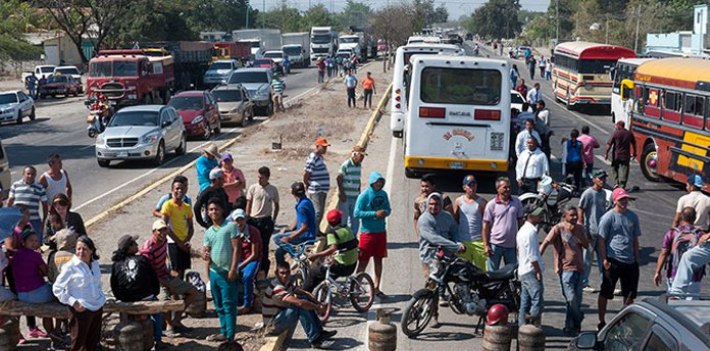Repression, Violation of the Constitution Are Usually the Last Recourse of Failing Governments

Closed roads in Caracas come in response to domestic gas shortages. (Runrun.es)
Anyone paying attention to the news in Latin American can see that Venezuela’s Maduro–Cabello administration is soon to be no more, as it is headed down an irreversible path toward self-destruction.
But how sure can we be about this?
Reviewing the literature about the topic of failed regimes allows us to identify eight symptoms of a ruling party’s terminal phase of power:
- A breakdown of the moral authority to govern.
- A significant weakening of popular support.
- A deteriorating international image and difficulty in achieving support and understanding for other countries.
- The inability to guarantee public peace and the security of individuals
- Symptoms of ungovernability (understood as the inability to control the economic or social trajectory of the country).
- Internal fracturing.
- Systematic violation of the Constitution to hold on to power and maintain privileges.
- Recurring repression: threats and fear tactics as a last resort to keep society under control.
Yes, the Maduro-Cabello admnistration is in “terminal” phase, but the word conveys a set of conditions — the eight symptoms — rather than a point in time or a concrete result. The outcome will depend on the regime’s response to the crisis, and above all on the opposition’s response along with the people’s support of that political alternative.
In accordance with the last symptom, the ruling elite has just announced that the country will be entering into a “state of emergency” that is nothing more than a desperate attempt to take refuge within the last redoubt of power remaining to it: the ability to repress.
When a government resorts to repression and militarization, it’s usually a sign that none of the usual democratic mechanisms based on voluntary obedience and legitimate authority are functioning.
This strategy can certainly be effective with part of the population, who may wrongly believe that the barking threats are a demonstration of strength. But one must remember that dogs bark from fear, too.
The most important symptoms, and which we must continue to monitor, are the repression and the constant violation of the Constitution — the traits that currently define the Maduro-Cabello administration. These measures are being rejected not only by the ruling party’s grassroots, but by army officers and other members of the state bureaucracy.
Many of them resent having to play the role of the sad henchman and endure, like the rest of us, the tragedy brought upon by the ruling elite’s delusions of power.
Ángel Oropeza Z. is a Venezuelan psychologist. He holds a PhD in Political Science and teaches at the Simón Bolivar University and at the Andrés Bello Catholic University in Caracas. Follow him on Twitter: @angeloropeza182. This article was originally published in El Nacional.
No comments:
Post a Comment